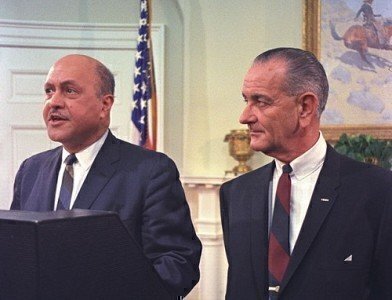Robert C. Weaver had a strong public record as a Civil Rights leader and a government official, but there was still some controversy when he became the first Black person nominated to a Cabinet-level position on this day in 1966.

President Lyndon Baines Johnson fought for and won congressional approval for Weaver, who was then 59 years old, with diminished opposition from southern Democrats. Five years earlier, President John F. Kennedy failed in a similar move.
Weaver was born on December 29, 1907 in segregated Washington, D.C. His grandfather was Dr. Robert Tanner Freeman, the first Black person to graduate from Harvard with a dentistry degree.
Robert Weaver followed in his grandfather’s footsteps to Harvard, and he had earned not one, but three, degrees by 1934, with a doctorate in economics.
Weaver returned home to work in President Franklin D. Roosevelt administration for Interior Secretary Harold Ickes. Weaver soon became a member of what was called Roosevelt’s “Black Cabinet” as a specialist in housing issues and an adviser on minority affairs.
In 1940, Weaver helped settle an incident involving Roosevelt’s press secretary, Stephen Early, who had knocked over a Black police officer during an incident in Washington.
The New York Times later recounted Weaver’s role in a 1997 obituary. An FDR aide had asked Weaver to assemble the Black Cabinet and write a speech that would appease Blacks.
'I don't think a mere speech will do it. What we need right now is something so dramatic that it will make the Negro voters forget all about Steve Early and the Negro cop too,” Weaver said. Within a day, Benjamin O. Davis Sr. became the first Black general in the Army and two other Black persons were appointed to prominent defense positions.
Weaver also worked to ensure that Black persons were allowed to play an important role in the industrial war effort at home.
After leaving the Roosevelt Administration in 1944, Weaver held an array of important academic and leadership positions. He taught at Northwestern, Columbia, and New York Universities; worked for the John Hay Whitney Foundation; served as New York state's rent commissioner; and was briefly the national chairman of the NAACP.
After his election, President Kennedy named Weaver as the head of the Housing and Home Finance Agency, a subcabinet-level department that combined the Federal Housing Administration, the Urban Renewal Administration and the Federal National Mortgage Association.
Kennedy wanted to upgrade the agency to a cabinet-level position in 1961 as the Department of Housing and Urban Development, with Weaver as its leader. Southern Democrats and Republicans blocked the move in Congress and enacted a law that blocked the president’s power to create a new cabinet-level department.
By 1965, President Johnson made the new department a priority, but he reportedly hadn’t settled on Weaver has its head. Johnson was considering several other candidates until he received a report from his aides about Weaver’s success as a leader and team builder.
On January 13, 1966, President Johnson announced he wanted Weaver named as the newest member of his cabinet, as secretary of the new Housing and Urban Development department that had been created in September 1965. Four days later, the Senate confirmed Weaver to the position.
Weaver served through the rest of the Johnson administration before returning to the academic world, as president of Bernard Baruch College and as a professor at Hunter College, Carnegie-Mellon and New York University.
At the time of his passing in 1997, at the age of 90, Weaver was remembered for his many accomplishments.
“Weaver was known especially as a brilliant tactician of the Black civil rights movement during its difficult early years,” said the Los Angeles Times.
“Dr. Weaver, who said that ‘you cannot have physical renewal without human renewal,’ pushed for better-looking public housing by offering awards for design. He also increased the amount of money for small businesses displaced by urban renewal and revived the long-dormant idea of Federal rent subsidies for the elderly,” said The New York Times.







